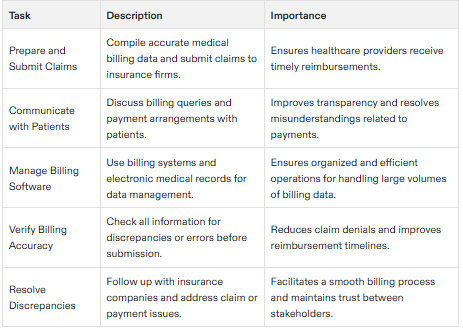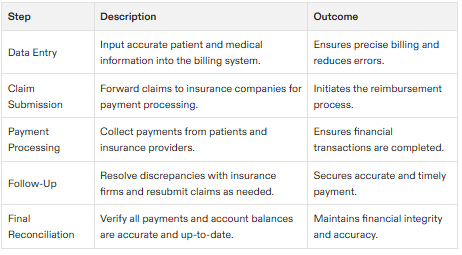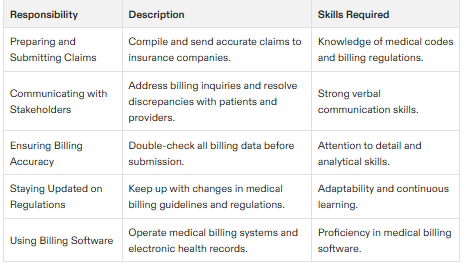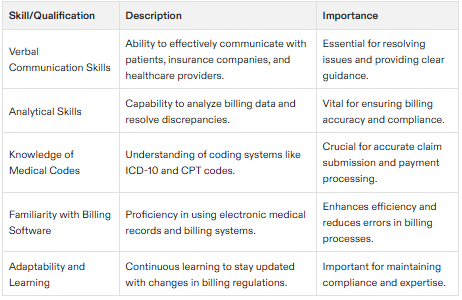Medical Biller Tasks
Essential Medical Biller Tasks: Duties and Responsibilities Explained
Medical Biller Job Description
A medical biller is responsible for a diverse set of tasks essential for processing patient billing information, known as medical biller responsibilities, including managing the billing process for healthcare providers, preparing and submitting medical claims to insurance companies. Billing insurance involves preparing and submitting claims to insurance companies, communicating with patients about payments, and ensuring the accuracy of medical information.
Medical billers work closely with healthcare providers, patients, and insurance companies to ensure accurate and timely payment for medical services.
The medical biller job description includes a range of tasks, from data entry and billing software management to patient communication and payment arrangements.
Medical Billing Process
The medical billing process involves several key steps, including data entry, claim submission, and payment processing. Processing payments is a critical part of the medical billing process, involving the submission of claims to insurance companies and the collection of payments from patients.
Medical billers must ensure that all billing data is accurate and up-to-date, and that claims are submitted to insurance companies in a timely manner.
The billing process also involves follow-up with insurance companies to resolve any issues or discrepancies.
Key Responsibilities
Medical billers are responsible for preparing and submitting medical claims to insurance companies. They must have a detailed understanding of medical procedures to accurately submit claims for services provided to patients. They must also communicate with patients and healthcare providers to resolve any billing issues or discrepancies. Medical billers must stay up-to-date with changes in medical billing regulations and guidelines.
Medical Biller Skills and Qualifications
Medical billers require strong verbal communication skills to communicate with patients, healthcare providers, and insurance companies.
They must also have strong analytical skills to manage billing data and resolve any issues or discrepancies. A thorough understanding of medical codes is essential for managing billing data and ensuring accurate claim submissions.
Medical billers must be familiar with medical billing software and technology, including electronic medical records and billing systems.
Medical Billing Software and Technology
Medical billers use a range of software and technology to manage the billing process, including electronic medical records and billing systems.
They must be familiar with medical billing codes and guidelines, including ICD-10 and CPT codes.
Medical billers must also be able to troubleshoot any technical issues that may arise during the billing process.
Medical Biller Certifications and Training
Medical billers can obtain certifications, such as the Certified Medical Reimbursement Specialist (CMRS) or the Certified Professional Coder (CPC). Medical coders, who play a crucial role in the healthcare system, can also obtain certifications such as the Certified Professional Coder (CPC). These certifications demonstrate a level of expertise and knowledge in medical billing and coding.
Medical billers can also obtain training through online courses or vocational programs.
Medical Biller Salary and Job Outlook
The salary for medical billers varies depending on experience and location, but the average salary is around $40,000 per year.
The job outlook for medical billers is strong, with a growing demand for skilled medical billers in the healthcare industry.
Medical Biller Career Opportunities
Medical billers can work in a range of healthcare settings, including hospitals, clinics, and private practices.
They can also work as independent contractors or start their own medical billing businesses.
Medical billers can also move into related roles, such as medical coding or health care administration.
Conclusion
In conclusion, a medical biller plays a crucial role in the healthcare industry, responsible for processing patient billing information, analyzing data, and using sound judgment to resolve billing issues. With the increasing demand for medical billing and coding professionals, it’s essential to understand the job description, responsibilities, and requirements of a medical biller. By possessing in-depth knowledge of billing software, medical insurance policies, and excellent communication skills, medical billers can ensure accurate and efficient billing processes. As the healthcare industry continues to evolve, the role of medical billers will become even more critical in ensuring that healthcare providers receive timely and accurate payments for their services. By staying up-to-date with changes in medical insurance policies and billing regulations, medical billers can continue to provide exceptional support to healthcare providers and patients alike.





